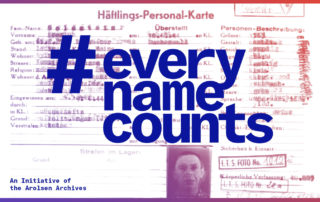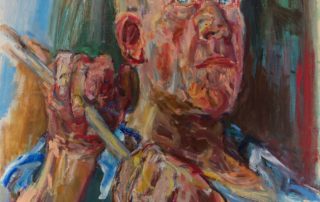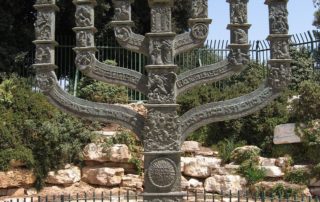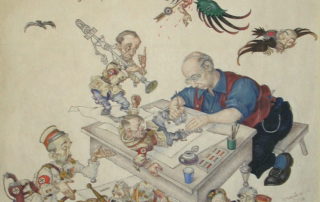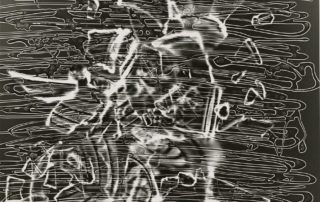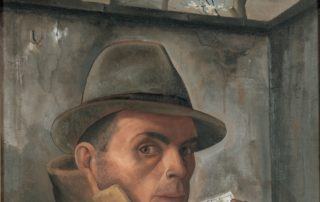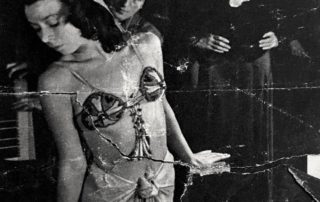Rachel Stern2022-02-18T06:42:00-05:00May 11th, 2021|Events, Past Events|
Join the Fort Tryon Jewish Center (FTJC) and the Fritz Ascher Society for a LIVE DATA ENTRY EVENT to help build the world’s largest digital monument to victims of the Holocaust: the Arolsen Archives’ #everynamecounts. THIS EVENT WAS NOT RECORDED. Opening Remarks Rabbi Guy Austrian Fort Tryon Jewish Center in New York Rachel Stern Director and CEO of the Fritz Ascher Society in New York Introduction and Moderation Elizabeth Berkowitz Digital Interpretation Manager of the Fritz Ascher Society in New York #everynamecounts is a crowd-sourced data entry initiative to return the names of Holocaust victims, their families, and details of their lives into the findable, keyword-searchable public record. Participants enter information about Nazi victims and family members from digitized [...]
Rachel Stern2022-02-18T06:37:23-05:00March 4th, 2021|Events, Past Events|
The International Tracing Service (ITS), since 2019 called Arolsen Archives, was established by the Allies in 1948 as a central search and information center. They house the world’s most extensive collection of documents about the victims of National Socialist persecution, including documents from Nazi concentration camps, ghettoes and penal institutions, documents about forced laborers, and documents from the early post-war period about Displaced Persons, mainly Holocaust survivors, former concentration camp prisoners, and forced laborers. People who had fled the sphere of influence of the Soviet Union for political reasons are also included. The archive's holdings consist of 30 million documents in total and belong to UNESCO’s Memory of the World. At this event, Floriane Azoulay (Director) and Giora Zwilling (Deputy [...]
Rachel Stern2022-02-18T06:04:58-05:00March 3rd, 2021|Events, Lectures, Past Events|
The Austrian artist Oskar Kokoschka (1886-1980) achieved world fame with his intense expressionistic portraits and landscapes. Rüdiger Görner, author of the first English-language biography, depicts the artist in all his fascinating and contradictory complexity. He traces Kokoschka’s path from bête noire of the bourgeoisie and a so-called ‘hunger artist’ to a wealthy and cosmopolitan political and critical artist who played a major role in shaping the European art scene of the twentieth century and whose relevance is undiminished to this day. In 1934, Kokoschka left Austria for Prague, and in 1938, when the Czechs began to mobilize for the expected invasion by the German Wehrmacht, Kokoschka fled to the United Kingdom, where he remained during the war. Although he [...]
Rachel Stern2022-02-18T07:06:06-05:00February 22nd, 2021|Events, Lectures, Past Events|
Born 1877 in Dortmund, the sculptor Benno Elkan (1877-1960) first studied painting in Munich and Karlsruhe. At the end of his studies, he turned to sculpture. As a young artist, he spent time in Paris, Rome, and Frankfurt. Elkan’s oeuvre was largely made up of commissions. In the beginning, he mainly created tombs. Medals, portrait busts of well-known personalities, monuments to victims and candelabras follow, partly for the religious (Jewish and Christian) context. Elkan fled persecution by the German Nazi regime to Great Britain in 1934and lived with his family in London until the end of his life. Perhaps the most important work besides the Menorah in Jerusalem (1956) was never built: Memorial to the Defenseless Victims of the Bombing [...]
Rachel Stern2022-02-18T06:31:18-05:00February 17th, 2021|Events, Lectures, Past Events|
During the first four decades of the twentieth century, Polish Jewish artist Arthur Szyk (1894–1951) was best known for his richly detailed book illustrations and magnificent illuminations on Jewish themes. He portrayed the Jews as a heroic nation that had resisted oppression through the ages and eventually triumphed. His Jews were fighters for their own freedom and the freedom of others. Szyk sought to redefine how the Jews viewed themselves and how others viewed them. His works thus challenged the notion that Jewish history was merely one long saga of suffering and, at the same time, refuted the then common antisemitic canard that the Jews were a cowardly people. With the coming to power in Germany of Adolf Hitler [...]
Rachel Stern2022-02-18T07:13:15-05:00December 3rd, 2020|Events, Lectures, Past Events|
Oskar Nerlinger (1893-1969) was one of the most important artists of the committed art scene in the Weimar Republic. He was a member of the Association of Proletarian Revolutionary Art (ASSO for short), which was founded in 1928 and belonged to the KPD, which cooperated with the Soviet avant-garde artist group Oktober. At that time there was no conflict between positions of aesthetic modernism and KPD politics. In 1932 the political and artistic avant-garde in the Soviet Union fell apart, with serious consequences for left-wing artists in Germany. Almost at the same time, the Nazi system broke with all forms of modernity. With his idea of art suddenly doubly isolated within his own party, which followed Stalin's art verdict, [...]
Rachel Stern2021-01-11T06:14:12-05:00December 2nd, 2020|Events, Lectures, Past Events|
WATCH THE RECORDING OF THIS EVENT HERE. More information about Janice Biala is available HERE. Lecture featuring Jason Andrew Independent Scholar, Curator and Producer in New York Introduced by Rachel Stern Executive Director of the Fritz Ascher Society in New York Biala (1903-2000) was a Polish born American painter whose career stretched over eight decades and spanned two continents. Through it all, she retained an intimacy in her art rooted in Old World Europe—sensibilities that began with memories of her childhood in a Polish village, shaped by School of Paris painters like Bonnard, Matisse and Braque, inspired by Velázquez and the Spanish Masters, and broadened by the community of loft-living artists in Post World War II Downtown New York. Her [...]
Rachel Stern2022-03-06T11:39:32-05:00September 30th, 2020|Events, Lectures, Past Events|
Lecture by Lynette Roth Daimler Curator of the Busch-Reisinger Museum and Head of the Division of Modern and Contemporary Art at the Harvard Art Museums Moderated by Rachel Stern Executive Director of the Fritz Ascher Society in New York Anneliese Hager (1904-1997) is one of a number of modern artists who began their artistic experimentation in Germany after National Socialist cultural policy began to harden against all forms of modern art. Her preferred medium was the photogram, a photographic image made by placing an object directly on (or in close proximity to) a light-sensitive surface and exposing it to light. Hager called the reversal of light and dark in the resulting contact print “white shadows.” [...]
Rachel Stern2020-10-07T15:08:59-04:00September 16th, 2020|Lectures|
WATCH THE RECORDING OF THIS EVENT HERE. Lecture featuring Anne Sibylle Schwetter, Curator of the Felix Nussbaum Collection in the Felix Nussbaum House in the Osnabrück Museum Quarter, Osnabrück Moderated by Rachel Stern, Executive Director of the Fritz Ascher Society in New York The German-Jewish artist Felix Nussbaum (1904 Osnabrück - 1944 Auschwitz) started a promising career in Berlin around 1930, which ended abruptly when the National Socialists came to power in 1933. Years in exile in Italy and Belgium followed. In 1942 Nussbaum went into hiding in Brussels. The artist's last paintings were created here from June 1943 until shortly before his arrest in June 1944. A little later he was murdered in Auschwitz. Like hardly any other painter [...]
Rachel Stern2020-09-16T19:55:58-04:00September 16th, 2020|Lectures|
View a recording of this event HERE. EXCLUSIVE: Watch Annette von Wangenheim's German language documentary film "Tanz unterm Hakenkreuz" from 2003 HERE. Big thanks to Annette von Wangenheim and Sabine Rollberg for making this possible! Gyp Schlicht speaks at 38:02 min. Lecture featuring Sabine Rollberg, Professor Emeritus of Documentary Film at the Academy of Media Arts in Cologne and former ARTE Representative and ARTE Commissioning Editor for WDR Moderated by Rachel Stern, Executive Director of the Fritz Ascher Society in New York In times of Nazi Germany, becoming an artist was not the typical career path for women. The „deutsche Frau“ was supposed to represent the “good housewife”, as a mother of many children, not wearing make-up and fancy dresses. The Nazis were refuting [...]


